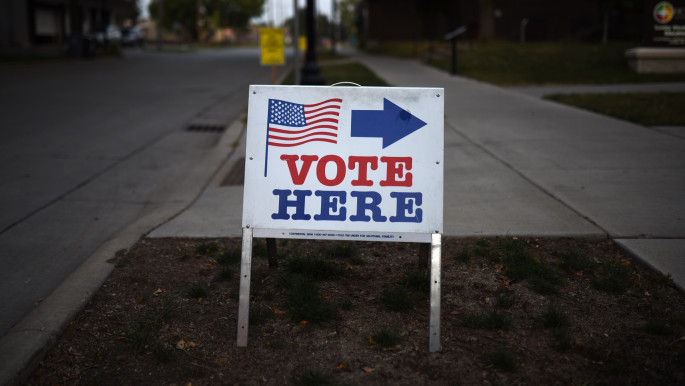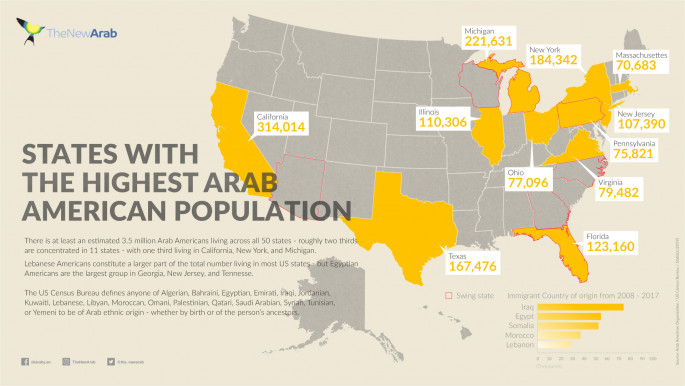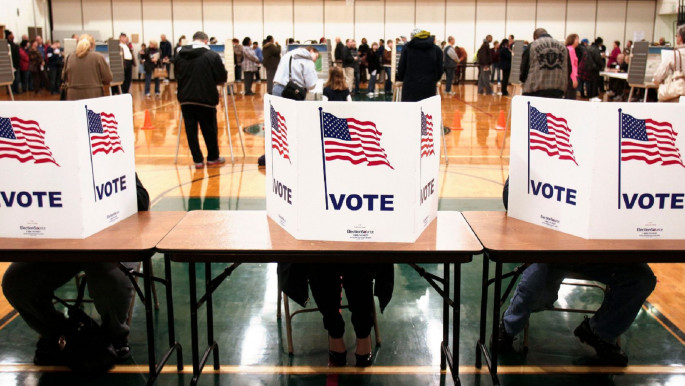'The stakes are high': Meet the Arab American volunteers rallying swing state voters for Biden
"We've seen this before, but not in our home country. We've seen it in democracies in transition. We were seeing it on our home turf," recalls Atala, a Palestinian American who grew up in the United States and was working in development aid.
That's when she was "woken up to civic engagement." She chose to leave her "liberal bubble" for North Carolina, where she believed she could make more of an impact.
"I had a client in Durham, North Carolina, so I made the decision to move here. It's a swing state, and I figured my vote would count. I could engage with people here," says Atala from North Carolina, where she voted on the first day of early voting, the same day Trump held a rally in the state.
It is among several key swing states that the Democratic Party hopes to flip in November, all of which have enough Arab and Muslim voters to make a difference.
Florida is another example. "We've got about 180,000 registered Muslim voters in Florida. Many races in the state are decided by one percent," says Farooq Mitha, senior advisor on Muslim American engagement, himself from Florida.
 |
Several key swing states that the Democratic Party hopes to flip in November all have enough Arab and Muslim voters to make a difference |  |
He noted, for example, in the 2018 senate race, incumbent Bill Nelson lost by 20,000 votes. "It can get razor-thin in Florida." That's why the Biden campaign's volunteers and staffers are reaching out to as many voters as possible from both parties.
Leaving no stone unturned in a historic election
"The stakes are so high. We've gone so far off the rails. It's not the Republican party of 2008 when McCain was a candidate. There are orphan Republicans. I voted Republican the first time. I've shifted since then," says Atala.
 |
|
| Read more: How Arab and Muslim voters could swing Michigan against Trump |
Indeed, she is one of many Arab Americans who have switched from the Republican to the Democratic Party, since the turn of the last century (largely prompted by 9/11) when the community was generally split evenly between the two parties.
Though many have returned to the Republican Party, the majority - who lean toward the Democratic Party - are much more engaged than in previous elections.
According to pollster James Zogby, turnout will be very high in this election with slightly more than 80 percent of Arab Americans saying they are very likely to vote, compared with 55.5 percent of the general population of eligible voters four years ago.
There are now hundreds of campaign volunteers in a group called Arab Americans for Biden. Similar affinity groups include: Muslim Americans for Biden, Syrian Americans for Biden, among many others.
"Several of us pulled together our thoughts on what we'd like to see from the Biden campaign. He put out a plan for the Arab American community – a plan for partnership. It's the first time a presidential nominee has put out an Arab-American agenda that we know of," says Brenda Abdelall, a lawyer who's volunteering for the Biden campaign in northern Virginia.
 |
More than 80 percent of Arab Americans say they are very likely to vote |  |
"If you look back at previous races, there hasn't been this level of engagement. We've done more than 150 Muslim-American campaign events. We've had the vice president speak directly to Muslim communities. It's at a level we haven't seen before. It's historic," says Mitha.
Zogby has seen a similar breadth of outreach in the Arab community. "I've never seen a website before in my 40 years of doing this. They've done stuff in Arabic. This is actually quite significant," he says. "I can't ignore reality that there's something different going on here. As someone who's been doing this my whole life, now we're getting respect."
From tepid to active engagement
Biden's Arab American and Muslim American agendas are comprehensive and groundbreaking, in that they refer to specific legislation, promise and acknowledge the need for police reform, and explicitly refer to "white nationalist terrorism."
"Biden will order his Justice Department to focus additional resources to combat hate crimes - including religion-based hate crimes - and to confront white nationalist terrorism," according to the vice president's website.
 |
|
| Click to enlarge |
Less surprising is that his agendas for the communities include undoing Trump's discriminatory policies, such as the Muslim travel ban - which he has said he will reverse on day one, welcoming at least 95,000 refugees per year, and will include Arabs as a separate category in the US Census.
All of these policies can have a profound impact on the communities they target, even the US Census category, which impacts funding for disadvantaged groups through federal procurements. The category would also help highlight healthcare and education disparities in Arab communities.
In addition to reversing Trump's discriminatory policies, Biden has also promised to revisit prior policies that have affected America's Arab and Muslim communities.
"We're really pleased to see the Biden campaign is not only committed to reversing the damage that Trump did, but also reversing harmful policies that pre-date the Trump Administration. The Arab-American community has been viewed through the lens of suspicion long before 9/11. By reversing many harmful policies, it's an acknowledgement that our communities have been targeted," says Abdelall.
Moreover, she and other organisers say they don't plan on resting after the election, even if the result is in their favour.
 |
There are now hundreds of campaign volunteers in a group called Arab Americans for Biden |
 |
A history of community engagement
Although Arab and Muslim political engagement is unprecedented in this year's election, to those from these communities, organising for causes is nothing new. In fact, tapping into their culture of strong community ties has been an important part of political engagement.
"When it comes to Muslims, we are a tight-knit community. Charity work comes naturally to us; it's part of our religious beliefs. Getting engaged politically in the USA had not been a priority for many of us," says Zulikha Hussain, in her fourth year with the Dallas County Democratic Party as Muslim outreach director.
"We're more passionate than we are strategic. Happily, we'll share a piece of bread with our neighbors," says Hussain. "Trump has really pushed all the wrong buttons."
 |
|
| Explainer: Why is the Arab American vote so important in the 2020 US election? |
Hussain, who has experienced an increase in xenophobic harassment over the past four years, sees Biden as a candidate who can unite the country – with its diverse communities and traditions.
"I don't know any faith that says steal and be corrupt. Issues people struggle with are LGBTQ and abortion. However, when you're forcing judgement on people, isn't that more of a sin? We're focusing on all of these manifestations of core issues. It's about preserving our democracy."
Hala Hijazi, who started door-knocking for Democrats before she was eligible to vote, has seen the evolution of fundraising from a rich man's game to the small-donor campaigns of Barack Obama and Bernie Sanders, marking a turning point in grassroots campaigning at the executive level.
"I don't think they didn't want to be involved, but they didn't know how to be involved. Part of it is that our community feels like no one listens to us," says Hijazi.
She explains, "Because of Obama and Bernie, over the last several years people have become excited. They realised they could be inspired and called to action. Their dollar mattered. A lot of campaigns asked for a lot of money. Campaigns are now realising it's just as powerful to ask for five dollars. Campaigns have become more accessible."
For Atala, her relatively newfound political engagement comes amid this growing movement of inclusive grassroots campaigning.
"I tell my friends 'I'm the new Jennifer.' I'm super engaged now, in a way I haven't been before," says Atala, who is working non-stop until election day to get Arab Americans to the polls through phone banking and facilitating Arabic translators.
"I'm doubling down. Biden is a good candidate for this moment. This what I love about my Arab culture. We're community oriented."
Brooke Anderson is a freelance journalist covering international politics, business and culture
Follow her on Twitter: @Brookethenews





 Follow the Middle East's top stories in English at The New Arab on Google News
Follow the Middle East's top stories in English at The New Arab on Google News


